Latest News
Rafale deal: SC reserves judgment on review petition, Centre sticks citing secrecy and national security
Published
7 years agoon
By

The Supreme Court today (Thursday, March 14) reserved in judgment on petitions seeking review of its December 14 verdict, that rejected pleas for a court-monitored probe into alleged irregularities in the Rafale deal, contending that the government had misled the court and withheld relevant information.
The Centre claimed privilege over documents pertaining to Rafale fighter jet deal produced by the petitioners. Attorney General KK Venugopal, arguing the case before the three-judge SC Bench headed by Chief Justice of India (CJI) Ranjan Gogoi and also comprising Justices SK Kaul and KM Joseph, told the Supreme Court that no one can produce these documents in the court without the permission of the department concerned.
After hearing both sides on the issue, the court reserved its judgment on the admissibility of the documents. It now has to decide whether the hearing on the review petition will continue with or without the documents in question.
The petitioners had appended files, published by the media, to substantiate its claims. The AG had argued that these were photocopies of confidential documents obtained unauthorisedly and the act amounted to theft.
Former union minister Arun Shourie, who is one of the petitioners along with former union minister Yashwant Sinha, thanked AG and the Govt. “We thank the A-G that by saying in their affidavit that these are photocopies, they have proved the genuineness of these documents,” said Shourie.
After hearing the arguments of the government and the petitioners, the Supreme Court reserved its order on the admissibility of the Rafale papers.
While arguing that state documents could not be published without explicit permission as the government had privilege over them, AG KK Venugopal sought removal of the “leaked” files submitted by the review petitioners from the records.
Referring to Section 123 of Evidence Act and provisions of RTI, Venugopal said, “Under the provision of Evidence Act, no one can produce privileged documents in court without permission of department concerned.” Venugopal submitted that the document can be withheld from disclosure RTI Act too.
The SC bench said RTI Act had an overriding effect on Official Secrets Act.
“What privilege do you (Attorney General) claim? They (petitioners) have already produced them in court. As per Section 22 and Section 24 of RTI Act ‘even intelligence and security establishments are bound to give information about corruption and human rights violations,” the bench said.
“RTI Act of 2005 was intended to bring a revolution, let us not go back,” said Justice KM Joseph stressing on RTI jurisprudence and its effect on disclosure of information which used to be withheld earlier on the grounds of security of State.
AG, resorting back to his “security” argument, said security of the state supersedes everything. “They (petitioners) have produced it after stealing it. State documents can’t be published without explicit permission,” Venugopal said.
“Is it that we (court) cannot even look into the documents even to ascertain whether the same is privileged?” Justice KM Joseph asks Attorney General KK Venugopal.
The petitioners’ counsel argued that the objection by Centre against disclosure of documents is malafide and the purpose of this objection is not to protect national security or defence secrets.
Prohibiting the court to consider the documents already published and in public domain is not the intent of 123, said the counsel for petitioners while contending that arguments advanced by the AG are untenable
He cited SP Gupta judgment that laid down that only test to be applied is test of public interest.
Pointing out that the documents in question have already been disclosed and are already in public domain, the petitioners also drew the court’s attention to the fact that, from time to time, the government itself has leaked these documents to friendly media – like leak of file notings of then Raksha Mantri Manohar Parrikar.
CAG report along with latest affidavit filed by the centre seeking privilege discloses many other defence deals, hence its contrary on AG’s part to say any disclosure of a defence deal possess treat to “national security”, argued the counsel.
At this, the Bench asked the petitioners’ counsel to restrict himself to submissions on Attorney General’s preliminary objection. “Only if we overrule the preliminary objection, we will go into other details,” said CJI Ranjan Gogoi.
At this, the petitioners submitted that certain documents which have been objected to by Centre now were already part of the petitioners’ submissions when the main case was filed in November last year.
He also cited 2G case wherein “same issue arose regarding disclosure of source” with respect to a register of visitors at a former CBI Director’s residence. In that case, the Supreme Court had turned down forner CBI Director Ranjit Sinha’s request to diclose identity of whistleblower who had accessed the visitors Register of Sinha’s residence.
He also cited judgments laying down that documents illegally obtained is admissible as evidence in court.
Here, he referred to Pentagon Papers case of USA. This was a case on whether defence documents relating to the Vietnam war could be published. The US Supreme Court in an emphatic judgment rejected the govt claim of national security.
“Of course, freedom of speech is much wider in US context, but still much of what was stated in that judgment applies here,” the petitioners argued.
Section 123 of Evidence Act does not apply here because it deals with unpublished documents; In this case documents have already been published, said the petitioners’ counsel, adding that none of the documents they have relied upon has anything to do with national security.
As the hearing concluded, Supreme Court reserved verdict on preliminary objections on maintainability raised by Centre.
Background:
Yesterday, the Centre filed an affidavit in the Supreme Court saying that documents attached in the petitions to review its Dec 14 verdict are sensitive to national security and their leakage by photocopying amounts to theft and puts national security in jeopardy.
The affidavit filed by the Ministry of Defence (MoD) asked the court to reject the review plea and said that the petitioners including former union ministers Yashwant Sinha and Arun Shourie are guilty of leaking sensitive information.
“Those who’ve conspired in this leakage are guilty of penal offences including theft by unauthorized photocopying and leakage of sensitive official documents affecting national security. These matters are now subject of an internal inquiry which commenced on Feb 28,” the government told the court.
In the affidavit, the government said the review plea has been widely circulated and is available to the country’s enemy and adversaries. It said that the documents attached by the petitioners in the Rafale review case relate to war capacity of the combat aircraft.
“This puts the national security in jeopardy. Without consent, permission or acquiescence of the Central Government, those who have conspired in making the photocopy of these sensitive documents and annexing it to the review petition/ miscellaneous application and thereby committing theft by unauthorized photocopying of such documents…have adversely affected the sovereignty, security and friendly relations with the foreign countries,” the affidavit said.
It said that even though the Centre “maintains secrecy”, the review petitioners are “guilty of leakage of sensitive information, which offends the terms of the agreements.”
“The petitioners are using unauthorisedly accessed documents with the intention to present a selective and incomplete picture of internal secret deliberations on a matter relating to National Security and Defence,” the affidavit said.
Previous hearing
Earlier, on Wednesday, March 6, as the SC Bench began hearing the review petitions, counsel for former Union finance minister Yashwant Sinha, the most high profile petitioner in the case, had urged the court to rap the Centre for perjury.
Placing reliance on a set of documents related to the Rafale deal and the negotiations between the Indian and French sides that preceded it but which came in the public domain after the December 14 verdict, Sinha’s counsel said the apex court had relied upon “a large number of serious errors of fact” while dismissing the prayer for a probe into the deal.
“Those facts were presumably supplied to the court by the Centre in sealed cover notes…Critical material facts were suppressed from the court… the government should be hauled up for perjury,” Sinha’s counsel said.
The Centre had vociferously opposed the review petitions and asked the SC to dismiss them as they were based on documents “stolen” from the ministry of defence. “It’s a criminal act on the part of petitioners to bring these documents with them. They have come with unclean hands,” Attorney General (AG) KK Venugopal had said. However, turn two days later the AG said the documents were not stolen, but the petitioners were using “photocopies of the original” papers.
As Venugopal argued the documents relied upon in the review petitions were “inadmissible” as they had been “procured through unfair means” in violation of the Official Secrets Act, he was interrupted by Justice KM Joseph.
“Issue of national security doesn’t arise when question in review is that plea of investigation hasn’t been considered. Are you going to take shelter under national security when the allegations are of grave crime, corruption,” Justice Joseph asked the Attorney General pointedly.
He added that the legal precedent with regard to admitting “stolen” documents as evidence was settled under the Evidence Act and said further that “if an act of corruption is committed, government cannot take shelter under the Official Secrets Act.”
The Attonery General’s submissions also provoked a pointed query from Chief Justice Gogoi who asked: “If an accused establishes the plea of alibi on the basis of a stolen document, should the court ignore it… Show us the authority that (disclosing the) source is important.”
The Chief Justice then noted that while violating the Official Secrets Act “makes a person liable for criminal punishment for obtaining secret documents”, courts or petitioners can “proceed against the person but will the document become null?”
Justice Joseph also referred to the Bofors case: “There were allegations of corruption in Bofors. Now, will you say the same thing that a criminal court shouldn’t look into any such document in that case? Here we have an open system.”
Justice SK Kaul also told the Centre’s chief law officer: “if the documents were stolen, the government should put its own house in order. It is one thing to say that we should look at these documents with suspicion. But, to say we can’t even look at those documents may not be a correct submission in law.”
Chief Justice Ranjan Gogoi even cited an example to the Attorney General, stating: “an accused is having difficulty in proving his innocence. He steals a document and shows it to the judge. The document clearly shows he is innocent. Should a judge ignore the document?”
The Chief Justice had finally told Sinha’s counsel: “If we accept the Attorney General’s arguments (on inadmissibility of documents), we reject these documents and hear your review petition minus these documents and if, we reject his submissions, we will then see how these documents are relevant to decide the review petitions.”
You may like
-


PM Modi, Macron reaffirm global strategic partnership during Delhi meeting
-
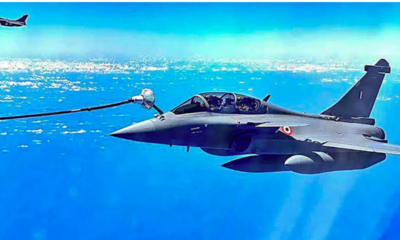

India clears Rs 3.25 lakh crore proposal to procure 114 Rafale fighter jets
-
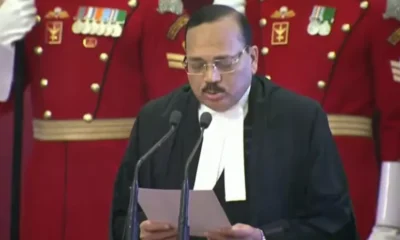

Justice Surya Kant takes oath as 53rd Chief Justice of India
-
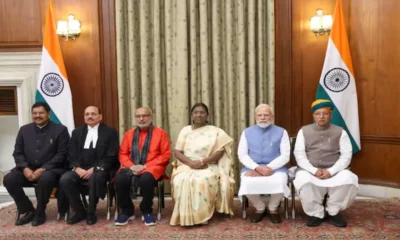

PM Modi attends oath ceremony of Justice Surya Kant, extends best wishes for his tenure
-
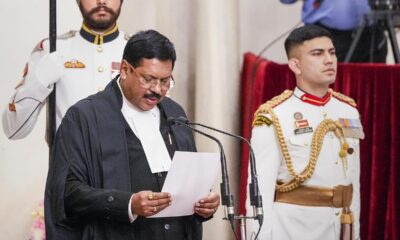

Justice B R Gavai sworn in as Chief Justice of India, PM Modi extends congratulations
-
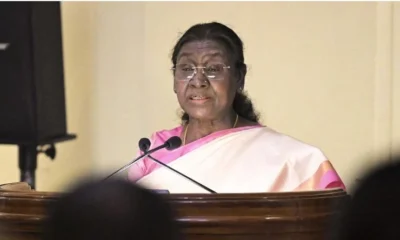

MHA plans review petition against SC ruling on President, Governor assent timelines
Entertainment
Kapil Sharma warned by MNS for referring to Mumbai as Bombay on Netflix show
Published
5 months agoon
September 12, 2025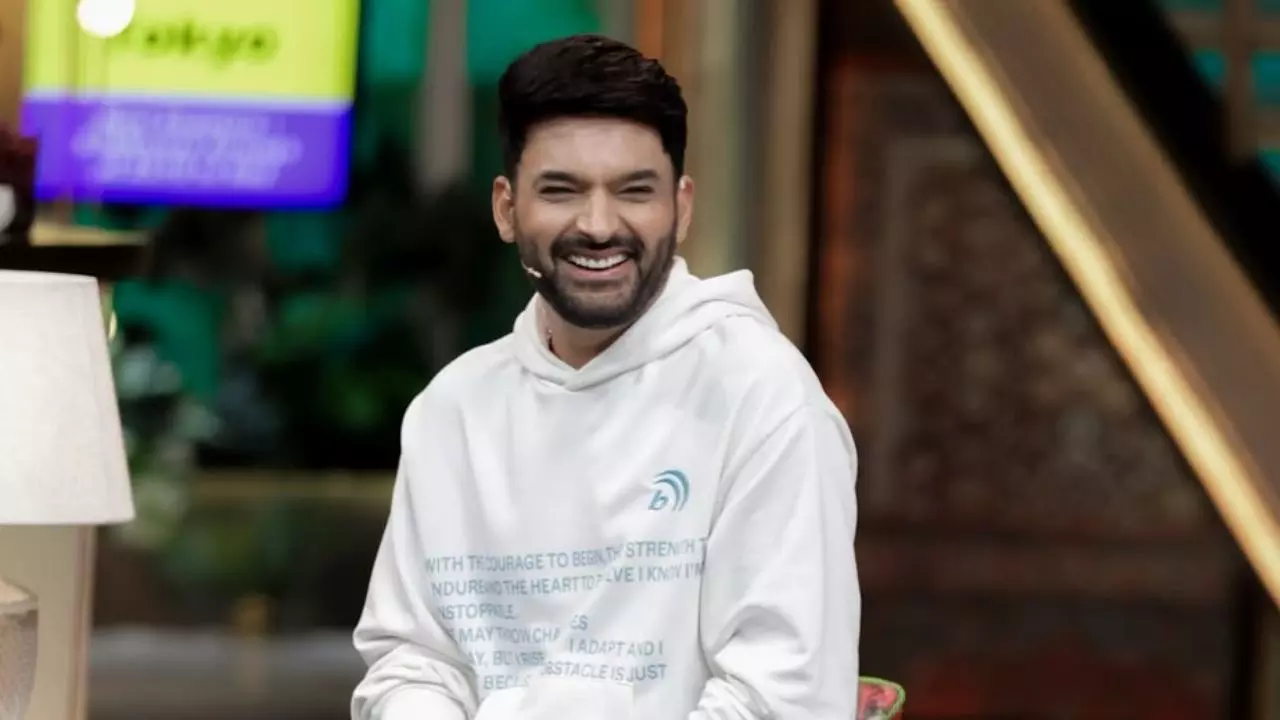
Bollywood comedian Kapil Sharma has come under the radar of the Maharashtra Navnirman Sena (MNS) after the use of the term Bombay instead of Mumbai on his Netflix show The Great Indian Kapil Show. MNS spokesperson Ameya Khopkar issued a warning, stating that the usage of the city’s former name could hurt the sentiments of its residents and demanded that the correct name, Mumbai, be used.
The controversy arose during an episode featuring actress Huma Qureshi, her brother Saqib Saleem, and the Shetty sisters. While talking about her bond with Saqib, Qureshi referred to the city as Bombay, explaining that she felt at home with him despite not being originally from the city. This comment drew criticism from the MNS, who have historically been vocal about protecting the identity and pride of Mumbai.
In a post on X, Khopkar stated in Marathi, that even though 30 years have passed since Bombay was officially renamed Mumbai, the term Bombay is still frequently used by celebrity guests on The Kapil Sharma Show, Delhi-based Rajya Sabha MPs, show anchors, and in many Hindi films. He noted that the name change was officially recognized by the Maharashtra government in 1995 and by the Central Government in 1996, preceding similar renamings in other major cities such as Chennai, Bengaluru, and Kolkata.
Khopkar further emphasized the seriousness of the matter during a media interaction in Mumbai. He stated that Sharma had been working in Mumbai for many years and described the city as his land of work. He added that the people of Mumbai admire him and watch his shows, and warned that the city and its residents should not be insulted, cautioning Sharma against repeating the mistake.
He added that if the reference had been made unintentionally, the mistake should be corrected immediately. Khopkar stated that all guests on the show, including celebrities and the host, should be informed in advance to refer to the city as Mumbai. He warned that if this is not followed, the MNS would launch a strong agitation.
The Great Indian Kapil Show has recently been renewed for a third season. Its first two seasons, comprising 13 episodes each, premiered in 2024, featuring a mix of Bollywood celebrities and entertainers. The controversy marks one of the few instances where the city’s political groups have publicly intervened over the naming of Mumbai on popular entertainment platforms.
Latest News
Indian-origin motel manager beheaded in the US
Published
5 months agoon
September 12, 2025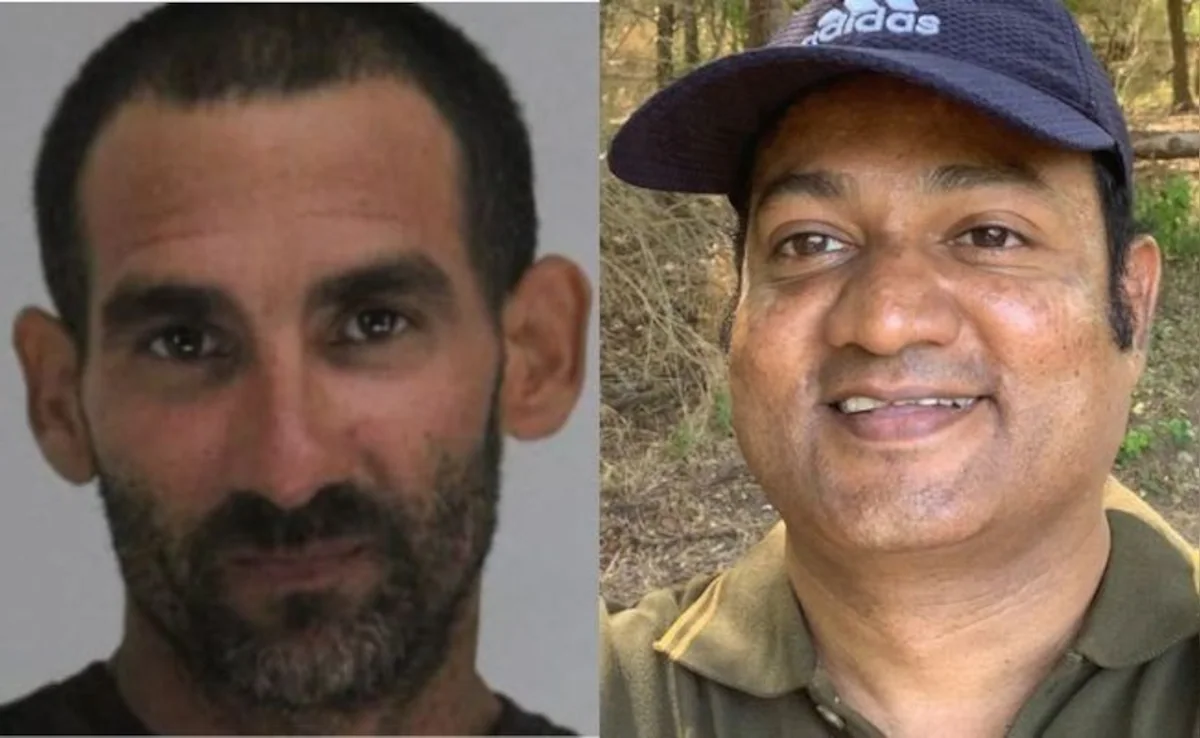
In a horrifying incident in Dallas, Texas, an Indian-origin motel manager, Chandra Nagamallaiah, was brutally beheaded by a guest following an argument over a malfunctioning washing machine. The gruesome attack was carried out by 37-year-old Yordanis Cobos-Martinez in front of Nagamallaiah’s wife and children, leaving the family traumatized.
According to court records and affidavits, the confrontation began when Nagamallaiah reportedly told Cobos-Martinez not to use a broken washing machine at the Downtown Suites motel. The suspect became enraged, partly because the manager relied on a woman present for translation instead of speaking directly to him. Surveillance footage later revealed Cobos-Martinez producing a machete and repeatedly stabbing and cutting Nagamallaiah, despite the efforts of his wife and child to intervene.
The affidavit details that the victim tried to flee to the motel’s front office while screaming for help, but the attacker followed him and continued the assault. Cobos-Martinez removed Nagamallaiah’s key card and cellphone before ultimately beheading him. Disturbing footage reportedly shows the suspect kicking the severed head across the ground before throwing it into a trash bin.
Cobos-Martinez, a Cuban national with a long criminal history, including convictions for grand theft, carjacking, false imprisonment, and sexual offenses, was arrested shortly after the attack. Authorities found him a block away wearing a blood-soaked T-shirt, along with the victim’s key card and cellphone. U.S. Immigration and Customs Enforcement (ICE) officials noted that Cobos-Martinez should not have been in the country at the time, as previous attempts to deport him to Cuba were unsuccessful due to his criminal record.
The Department of Homeland Security described the beheading as unthinkable and stated that the case highlights the critical need for strict immigration enforcement. A witness to the attack told NBC DFW that they could not explain what they saw, describing the suspect as appearing there and not there at the same time, emphasizing the surreal and terrifying nature of the crime.
This shocking incident has left the Dallas community and Nagamallaiah’s family in deep distress, as authorities continue their investigation into the motive and circumstances surrounding the brutal murder.
India News
AAP MP Sanjay Singh accuses J&K authorities of house arrest, Farooq Abdullah condemns move
Published
5 months agoon
September 11, 2025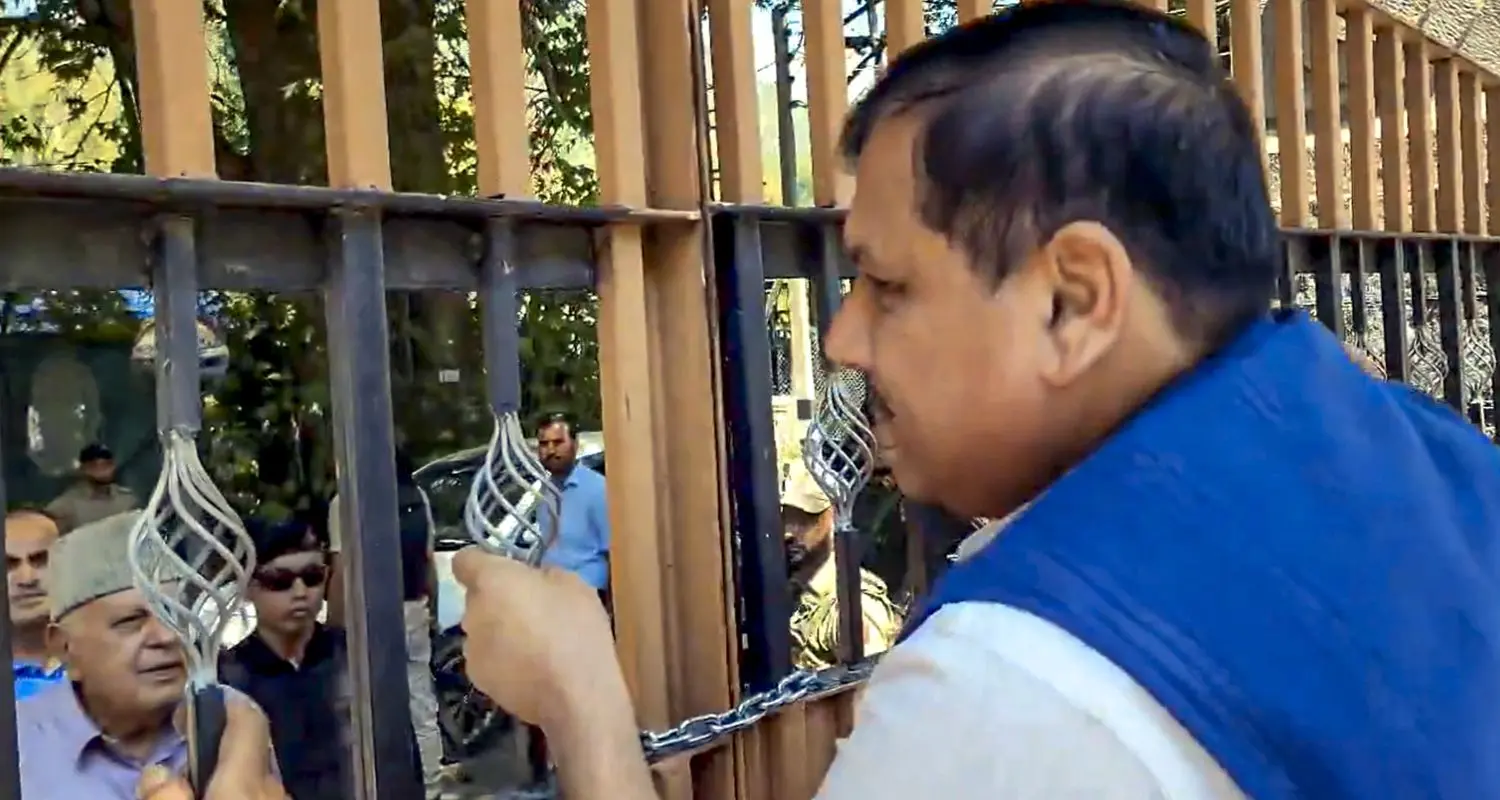
Aam Aadmi Party (AAP) MP Sanjay Singh on Thursday accused Jammu and Kashmir Lieutenant Governor Manoj Sinha of placing him under house arrest while he was in Srinagar to protest the detention of the party’s sole J&K MLA, Mehraj Malik.
Singh climbed the gate of a government guest house in Srinagar to meet National Conference (NC) chief Farooq Abdullah and later shared visuals of the interaction on social media. He said it was a very sad thing that Abdullah, who has served multiple terms as Chief Minister of Jammu and Kashmir, came to meet him at the guest house after learning about his alleged house arrest but was not allowed to do so. Singh further questioned the authorities’ actions, asking whether if this is not dictatorship, then what it is.
Malik, the MLA from Doda Assembly seat, has been detained under the Public Safety Act (PSA) on charges of disturbing public order. This marks the first instance of a sitting lawmaker being booked under the PSA, which allows authorities to detain individuals without charge or trial for up to two years. Singh alleged that Mr. Malik’s detention was retaliation for raising people’s issues in his constituency.
Abdullah also condemned the attempts to stop Singh from holding his protest. In a statement to news agency ANI, he said that preventing Singh from exercising his right to protest was absolutely wrong and accused the Lieutenant Governor Sinha of misusing his powers. He stressed that the right to protest is guaranteed by the Constitution of India, noting that Jammu and Kashmir being a union territory gives the LG significant authority, which, according to him, was being used for the wrong purposes. Abdullah questioned whether it was necessary to prevent Singh from speaking and asserted that this is not an autocracy, there is a constitution here.
Abdullah drew parallels with the recent unrest in Nepal, where protests led to the resignation of Prime Minister KP Sharma Oli, and cautioned that India must safeguard its Constitution to prevent similar circumstances. He urged the LG to uphold constitutional principles, warning that failure to do so could risk unrest, and emphasized the need to take care of the Constitution before such a fire breaks out in the country.
Other opposition leaders, including AAP chief Arvind Kejriwal and Shiv Sena (UBT) leader Sanjay Raut, also expressed concern over the move, condemning what they described as an infringement on democratic rights.

Trump signs 10% global tariffs after US Supreme Court setback

PM Modi meets Sri Lankan President Dissanayake at AI summit, reviews connectivity agenda
RSS not seeking political power, focused on uniting Hindu society, says Mohan Bhagwat

India studying implications after US Supreme Court strikes down Trump’s global tariffs

India studying implications after US Supreme Court strikes down Trump’s global tariffs
RSS not seeking political power, focused on uniting Hindu society, says Mohan Bhagwat

PM Modi meets Sri Lankan President Dissanayake at AI summit, reviews connectivity agenda

Trump signs 10% global tariffs after US Supreme Court setback

BJP MLA Vungzagin Valte dies after prolonged battle with injuries from Manipur violence
Afghan Men Try To Hang With The Jet Engine Of The Aircraft in Kabul- Afghanistan News – Kabul News
Trending Top 10 News: 10000 Crore Fine on Flipkart, Apple to Launch Unique Feature, Hdfc Bank Job Ad
Trending Top 10 News: Nokia 6310, Apple sales, Bachpan ka Pyar Video Kid, Dainik Bhaskar IT Raid
Trending Top 10 News: Canada bans Indian flights, Rain in Delhi NCR, AIMIM Twitter hacked, Raj Kundra case
Trending Top 10 News: Shein India, Apple New Service, Pocket Oxygen, Oppo Launched New Phone
Trending
-

 Latest world news13 hours ago
Latest world news13 hours agoTrump signs 10% global tariffs after US Supreme Court setback
-

 Latest world news13 hours ago
Latest world news13 hours agoPM Modi meets Sri Lankan President Dissanayake at AI summit, reviews connectivity agenda
-

 India News13 hours ago
India News13 hours agoRSS not seeking political power, focused on uniting Hindu society, says Mohan Bhagwat
-

 Latest world news4 hours ago
Latest world news4 hours agoIndia studying implications after US Supreme Court strikes down Trump’s global tariffs

